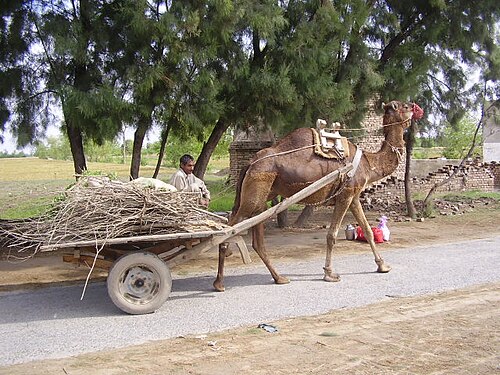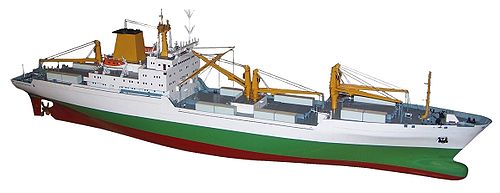Cameladjective
Of a light brown color like that of a camel.
Camelnoun
A large ruminant used in Asia and Africa for carrying burdens and for riding. The camel is remarkable for its ability to go a long time without drinking. Its hoofs are small, and situated at the extremities of the toes, and the weight of the animal rests on the callous. The dromedary (Camelus dromedarius) has one bunch on the back, while the Bactrian camel (Camelus Bactrianus) has two. The llama, alpaca, and vicuña, of South America, belong to a related genus (Auchenia).
Camelnoun
A water-tight structure (as a large box or boxes) used to assist a vessel in passing over a shoal or bar or in navigating shallow water. By admitting water, the camel or camels may be sunk and attached beneath or at the sides of a vessel, and when the water is pumped out the vessel is lifted.
Camelnoun
cud-chewing mammal used as a draft or saddle animal in desert regions
Camel
A camel is an even-toed ungulate in the genus Camelus that bears distinctive fatty deposits known as on its back. Camels have long been domesticated and, as livestock, they provide food (milk and meat) and textiles (fiber and felt from hair).
Shipnoun
A water-borne vessel generally larger than a boat.
Shipnoun
A vessel which travels through any medium other than across land, such as an airship or spaceship.
Shipnoun
A sailing vessel with three or more square-rigged masts.
Shipnoun
A dish or utensil (originally fashioned like the hull of a ship) used to hold incense.
Shipnoun
(cartomancy) The third card of the Lenormand deck.
Shipnoun
(fandom) A fictional romantic relationship between two characters, either real or themselves fictional.
Shipverb
(transitive) To send by water-borne transport.
Shipverb
(transitive) To send (a parcel or container) to a recipient (by any means of transport).
Shipverb
(ambitransitive) To release a product to vendors; to launch.
Shipverb
(ambitransitive) To engage to serve on board a vessel.
Shipverb
(intransitive) To embark on a ship.
Shipverb
To put in its place.
Shipverb
(transitive) To take in (water) over the sides of a vessel.
Shipverb
(transitive) To pass (from one person to another).
Shipverb
To go all in.
Shipverb
(sports) To trade or send a player to another team.
Shipverb
(rugby) To bungle a kick and give the opposing team possession.
Shipverb
(fandom) To support or approve of a fictional romantic relationship between two characters, either real or themselves fictional, typically in fan fiction.
Shipnoun
Pay; reward.
Shipnoun
Any large seagoing vessel.
Shipnoun
Specifically, a vessel furnished with a bowsprit and three masts (a mainmast, a foremast, and a mizzenmast), each of which is composed of a lower mast, a topmast, and a topgallant mast, and square-rigged on all masts. See Illustation in Appendix.
Shipnoun
A dish or utensil (originally fashioned like the hull of a ship) used to hold incense.
Shipverb
To put on board of a ship, or vessel of any kind, for transportation; to send by water.
Shipverb
By extension, in commercial usage, to commit to any conveyance for transportation to a distance; as, to ship freight by railroad.
Shipverb
Hence, to send away; to get rid of.
Shipverb
To engage or secure for service on board of a ship; as, to ship seamen.
Shipverb
To receive on board ship; as, to ship a sea.
Shipverb
To put in its place; as, to ship the tiller or rudder.
Shipverb
To engage to serve on board of a vessel; as, to ship on a man-of-war.
Shipverb
To embark on a ship.
Shipnoun
a vessel that carries passengers or freight
Shipverb
transport commercially
Shipverb
hire for work on a ship
Shipverb
go on board
Shipverb
travel by ship
Shipverb
place on board a ship;
Ship
A ship is a large watercraft that travels the world's oceans and other sufficiently deep waterways, carrying goods or passengers, or in support of specialized missions, such as defense, research, and fishing. Ships are generally distinguished from boats, based on size, shape, load capacity, and tradition.







































































